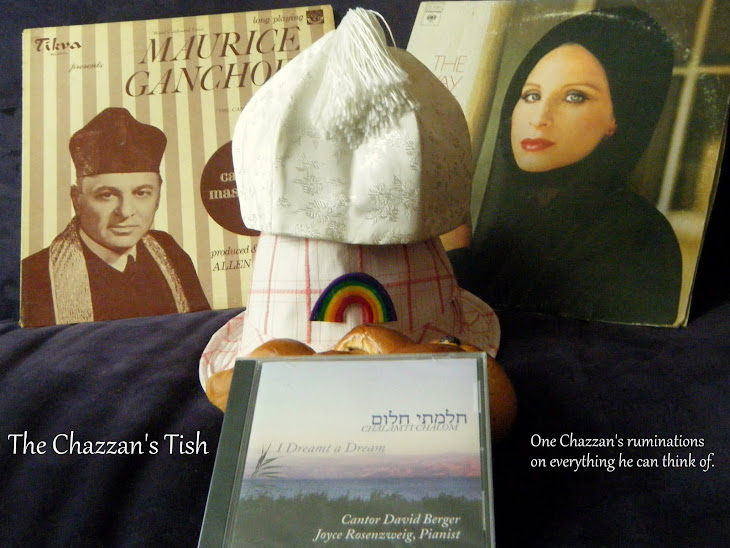This coming Saturday we will join together for Selichot, the special petitionary prayers that help prepare our souls for the Yamim Nora'im, the Days of Awe, which are rapidly approaching.
Download Cantor David Berger - Adam Y'sodo Mei'afar
This week I had the intense pleasure of meeting a brand new baby. Some of my best friends in the world are now proud parents, and this amazingly beautiful baby begins a life that I pray is filled with health, joy, love and success.
Babies bring a special kind of joy to everyone who sees them. We are evolutionarily programmed to love them and to want to provide for them. Put me anywhere near a baby and out come the funny faces, crazy sounds and an un-erasable smile.
Babies also remind us of the very nature of life. We see this tiny creature that is totally dependent on support from people and we are sometimes reminded of all the support upon which we depend. Though we grow older and develop many different kinds of independence, ultimately our very lives demand the help and support of others, and in this modern society our lifestyles require the labors of workers all over the globe.
It is all quite fragile - we are all quite fragile. It is stunning to imagine what would happen were some of these interconnections and dependencies disrupted.
During Rosh Hashanah and Yom Kippur we recite the great "Un'taneh Tokef." Most famous for the "who shall live and who shall die" section, this piyut (liturgical poem) is filled with incite on the fragility of our lives and on the nature of humanity.
Not far after the whole "who by fire and who by water" section comes a short reflection on the transience of our lives - essentially, on our own mortality.
All of humanity is founded on dust -Why are we dwelling on this at this moment? Why do we have to be thinking about our own mortality - isn't it more fun to think about babies and puppies?
of dust they are made, and to dust they return;
as long as they live, they strive for their bread.
Like vessels of clay, they can break.
Like grass they can wither, like flowers they fade,
like shadows they pass, like clouds they are emptied,
like wind their strength is exhausted,
like dust they are scattered about,
like a dream they shall vanish from sight.
Here's one answer from Catholic theologian Henri J. M. Nouwen (1932-1996). This comes from the introduction to his short *and amazing* book called "Reaching Out: The Three Movements of the Spiritual Life" (on page 18)
During our life we become more aware not only of our crying loneliness but also of our real desire for a solitude of the heart; we come to the painful realization not only of our cruel hostilities but also of our hope to receive our fellow humans with unconditional hospitality; and underneath all of this we discover not only the endless illusions which make us act as if we are masters of our fate but also the precarious gift of prayer hidden in the depth of our innermost self.What illusion is he talking about? Primarily the illusion that we are immortal - that we ourselves need not face death. It is only by overcoming that illusion that we can reach the deepest and most authentic voice of prayer that resides within us.
Un'taneh Tokef is quite harsh and tries to drum into us the basic fact that our lives are not in our own hands. The control that we think we have over the world is one of the illusions we must come to terms with. Each of us is able to do great works, to achieve amazing accomplishments and move the world forward - but none of us is in control.
Download Cantor David Berger - Adam Y'sodo Mei'afar
So we come to this haunting melody for this small section of Un'taneh Tokef. Originally composed by Cantor Abram Brodach who lived and worked mostly in New Haven - this melody has been altered slightly by Joyce Rosenzweig, and then re-arranged a little bit by myself.
Adam y'sodo mei'afar
V'sofo lei'afar
B'nafsho yavi lachmo
Yavi lachmo.
It is possible to become a bit morbid in our contemplation of mortality - however - immediately following this text, Un'taneh Tokef reminds us that though we are transient - God is Eternal. "But You are the Sovereign! The God who lives and endures."
Yes - we fade away and our lives are by definition finite - but our lives are ever enriched by God who is eternal. We are never forgotten and the part of ourselves that is reflected in God's own image remains a part of the universe.
I'm in the middle of knitting a baby blanket for this wonderful, beautiful new soul that I just met this week. Though I cannot control the world, and cannot even know for sure if I can control my own schedule in this coming week - I can provide some warmth and joy to a new baby and her parents. Who needs eternity when I have that?
Hope this weekend's Selichot services bring you one step (or maybe more than one) closer to being ready for the Days of Awe.


No comments:
Post a Comment